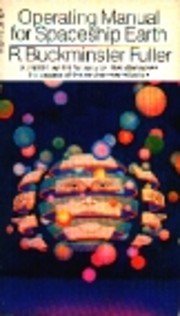

Click on a thumbnail to go to Google Books.
|
Loading... Operating Manual for Spaceship Earth (1969)by R. Buckminster Fuller
 None No current Talk conversations about this book. Five stars for what this book is, a short explanation of the philosophy of technical optimism of R. Buckminster Fuller. However, Fuller writes in a dense style that is sometimes hard to read. By the way, this is not an operating manual at all, it focuses more on concepts rather than tactics. Spoiler alert - the key is that we work together and stop creating false differences between people (nations, rich and poor, races). This book is a time capsule that helps us see our intellectual progress since it was published. Actually, it is almost useless. Back then we thought it was great stuff, but only because almost everything else was even worse. One might get excited over the fact that there is a chapter titled General Systems Theory. Actually the chapter is so vague it is almost useless. The name R. Buckminster Fuller brings up images of geodesic domes for most people. I found a paperback 1973 printing of the 1969 book with a properly psychedelic deconstructed sphere/face on the cover. Only after reading the book did I find out we already had a copy (much newer edition) without the cool cover. Fuller's premise is that the earth, like a spaceship, needs to have all its systems working as one, that there has to be a balance between resources and their use. He carries the metaphor through various scientific explanations (most of which were beyond my knowledge) to show why our lives depend on the maintenance of our spaceship. A wonderful premise and metaphor -- seems really a propos as we look at climate change becoming irreversible by 2030. It's also scary that in the time since this was written not many have paid heed. no reviews | add a review
"One of Fuller's most popular works, Operating Manual for Spaceship Earth, is a brilliant synthesis of his world view. In this very accessible volume, Fuller investigates the great challenges facing humanity. How will humanity survive? How does automation influence individualization? How can we utilize our resources more effectively to realize our potential to end poverty in this generation? He questions the concept of specialization, calls for a design revolution of innovation, and offers advice on how to guide "spaceship earth" toward a sustainable future."--Jacket No library descriptions found. |
Current DiscussionsNonePopular covers
 Google Books — Loading... Google Books — Loading...RatingAverage: (3.76) (3.76)
Is this you?Become a LibraryThing Author. |
||||||||||||||||||||||||||||||||||||||||||||||||||||||||||||||||||||||||||||||||||||||||||||||||||||||||||||||||||||||||||
Fuller paints both optimistic and pessimistic perspectives of the future of mankind on this planet.
After going through some of the history of our species' expansion, exploitation, and innovations of the past, we are provided with economics and technology and sociological lessons of current contrasted to past and potential future states of being as a culture.
As this edition was published in 1978, the ensuing 40 years have not been kind toward achieving Fuller's vision. To whit, we are further separating as haves and have-nots.
5 stars for concept and vision. 4 stars for presentation. I had to read the text twice over the past month to be able to cogitate on his concepts and ideas. (